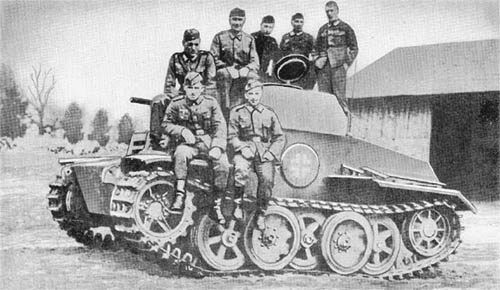
This vehicle, one model of which is shown above, is called an armored car by the Germans. Production began in 1941 and continued through 1943. Models VK 1201, VK 1202, and VK 1303 were manufactured by Maschienfabrik Augsburg-Nurnberg.
The box-shaped superstructure is built in with the hull chassis. The thickness of armor of the Lynx is 30 mm on the front of the turret and hull and 20 mm on the turret and hull sides. One gasoline tank located inside on the right holds 83 gallons.
Track guards are provided well over the sprockets and idlers only. The turret roof slopes down towards the front and terminates in a cylindrical shape. The engine compartment is at the rear. Old models had smoke projectors, three on each side which were electrically operated. New model 1303 has no such provision.
Throat microphones were used for intra-tank communication. Periscopes and an optical sighting device are provided in the turret.
The suspension consists of torsion bar straddle-mounted Christie type bogie wheels with center guide steel track, front drive sprocket and rear idler.
The first two models were equipped with Dreislufenlenkung, three-step clutch type steering, while Model VK 1303 has the same system as the Panther—Einradien-Lenkgetriebe, one radius steering. Evolution of this vehicle stems from development of the
The transmission is synchromesh selective and adapts itself to the steering mechanism. There are seven speeds forward and one reverse; synchromesh cones are provided for all gear ratios except low and reverse.
SPECIFICATIONS
| Weight | 12.9 tons | |
| Length (overall) | 15 ft., 2 ins. | |
| Width (overall) | 8 ft., 1 1/2 ins. | |
| Height (overall) | 7 ft., 3 ins. | |
| Ground clearance | 16 ins. | |
| Tread centers | 6 ft., 10 ins. | |
| Ground contact | 7 ft., 3 ins. | |
| Width of track | 14 ins. | |
| Pitch of track | ||
| Track links | 67 | |
| Fording depth | 4 ft., 7 ins. | |
| Theoretical radius of action | ||
| Roads | 155 miles | |
| Cross-country | 93 miles | |
| Speed | ||
| Roads | 50 m.p.h. | |
| Cross-Country | 25-30 m.p.h. | |
| Armor | ||
| Front | 30 mm | |
| Sides | 20 mm | |
| Armament | One 2 cm Kw. K. 38 and one 7.92 mm M. G. 34 | |
| Ammunition (Rds.) | 400 (2 cm): 1.200 (M. G. 34) | |
| Engine | 178 British B.H.P. | |
| Transmission | Synchromesh, 7 speeds forward; 1 reverse | |
| Steering | One radius double drive epicyclic | |
| Crew | 4 |
German: p. 8.1